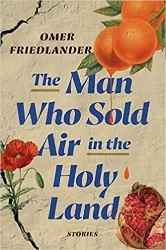In his debut short story collection, Omer Friedlander probes Israeli society through the lens of the manifold people who inhabit it. Stories about Israel often touch upon the familiar: checkpoints, mandatory conscription, the echo of the Shoah. Friedlander both displays and subverts these motifs, portraying the diverse experiences of Israel without casting judgment on any one perspective.
Friedlander sets the tone with “Jaffa Oranges,” a story about a Jewish owner of an orange grove who recalls an Arab friend from his youth when the man’s granddaughter suddenly appears. It is a great selection for the first story, exemplifying Friedlander’s prowess with subtle yet evocative language and his empathy for all kinds of people.
Many of Friedlander’s characters are conflicted about what Israeli life expects of them. In “Checkpoint,” a peacenik mother grieves for her son killed in combat as she monitors the checkpoints for signs of the Israeli Defense Force’s misbehavior: “I have sent my son off to be killed in a war I don’t believe in, fighting for a government I hate.” Friedlander demonstrates the anguish Israelis must endure while also criticizing the treatment of Palestinians. Though the story does not solely center around the conflict, the brutality of the situation provides the landscape, and it is not left unexamined.
“Alte Sachen” takes a lighter, more humorous tone, even when tackling a serious subject. The story follows two brothers who pluck an addled old man off the streets and pretend he is their Holocaust-survivor grandfather to their class, who are all presenting survivors of their own. Buoyed by irreverence, “Alte Sachen” deftly portrays the way the Shoah informs contemporary Israeli society, and the line it draws between Ashkenazim and Sephardim.
For those looking to understand the intricacies of Israeli life, The Man Who Sold Air in the Holy Land provides an excellent immersion. Friedlander is graceful and lyrical in his exploration of his homeland, critiquing the violence of the historical and present-day situation while never coming across as heavy-handed. Ultimately, he gives readers the opportunity to make their own assessments of this unique world. Friedlander is following the lineage of brilliant, understated Israeli writers like Amos Oz and David Grossman in capturing the particularities of Israel through intelligent prose and subtle characterizations.
Ariella Carmell is a Brooklyn-based writer of plays and prose. She graduated from the University of Chicago, where she studied literature and philosophy. Her work has appeared in Alma, the Sierra Nevada Review, the Brooklyn review, and elsewhere.


